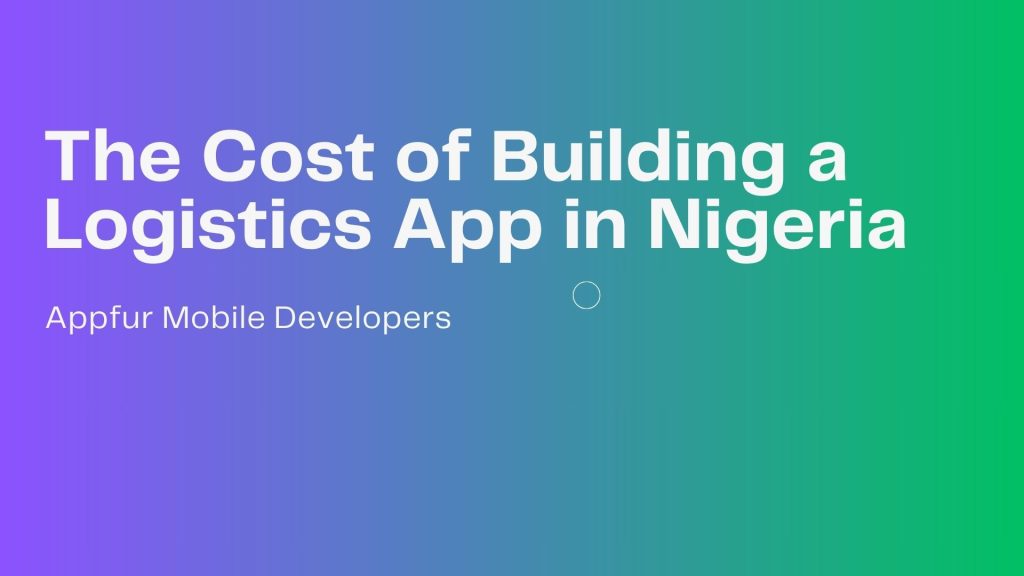Did you know that Nigeria’s logistics sector is projected to exceed ₦2 trillion by 2026, fueled by rising e-commerce activity, last-mile delivery services, and tech-driven courier platforms? From delivery startups to fleet management systems, mobile apps are now the engine powering logistics across the country.
If you’re thinking of building a logistics app in Nigeria, one question stands out:
How much will it cost?
Let’s break it down.

1. What Kind of Logistics App Do You Want to Build?
Your app type will determine the complexity, features, and cost of development. Common types of logistics apps in Nigeria include:
- Courier Delivery Apps (like Gokada, Kwik, or GIG Go)
- On-Demand Delivery Platforms for food, parcels, groceries
- Fleet Management Systems for vehicle and driver tracking
- Truck-Hailing or Freight Apps (like Kobo360)
- Warehouse Management and Inventory Tracking Apps
- B2B Logistics Platforms connecting businesses with delivery services
Each model has unique requirements for mapping, route optimization, real-time tracking, and payment integration.
2. Essential Features for a Nigerian Logistics App
For your app to thrive in Nigeria’s challenging infrastructure and network conditions, it must offer practical, reliable features such as:
- User registration/login (customer, admin, driver)
- Real-time GPS tracking and mapping
- Order creation and package management
- Delivery status updates and notifications
- Payment gateway integration (Flutterwave, Paystack, etc.)
- Driver app with delivery route optimization
- Admin dashboard for order and fleet management
- Ratings and feedback system
- SMS/email alerts for delivery confirmations
- Offline mode and data syncing (for poor internet zones)
The more automated and intelligent your system is, the more competitive you’ll be.
3. Design and User Experience: Local Challenges to Consider
In Nigeria, most users will access your app via low- to mid-range Android smartphones. So your logistics app should be:
- Lightweight and fast-loading
- Battery- and data-efficient
- Able to work offline or with weak internet
- Built with intuitive UI and local language options (e.g., Pidgin, Hausa)
A clean, simple user experience improves driver adoption, customer retention, and overall performance.
4. Development Cost Breakdown in Nigeria
The cost of building a logistics app in Nigeria depends on its complexity, feature set, and whether you use freelancers or an experienced app development agency. Here’s a realistic breakdown:
- Basic Logistics MVP: ₦4 million – ₦7 million
- Features: Order booking, driver registration, basic tracking, admin panel
- Mid-Level Logistics App: ₦8 million – ₦15 million
- Features: Real-time tracking, route mapping, digital payments, SMS alerts, multiple user roles
- Advanced Platform with Fleet or Freight Management: ₦18 million – ₦30 million+
- Features: Automated dispatch, performance analytics, GPS sync, CRM integration, API access
Note: These costs may vary based on backend infrastructure (Firebase, Node.js, Laravel, etc.), timeline, and scalability options.
5. Who Should Build Your Logistics App?
The cost also depends on who you hire to develop the app:
- Freelancers are affordable but may struggle with scaling and security.
- In-house teams are great for control but expensive and time-consuming to assemble.
- Agencies like Appfur offer professional, end-to-end service—from planning to design, development, testing, and post-launch support.
At Appfur, we’ve worked with logistics startups and delivery services across Nigeria. Our deep local knowledge allows us to design logistics solutions that work seamlessly across cities like Lagos, Abuja, and Port Harcourt.
6. Other Costs You Should Plan For
Aside from app development, here are key additional costs:
- Cloud hosting and geolocation services
- SMS gateway and data sync tools
- Third-party APIs (e.g., Google Maps, NIBSS)
- Maintenance and bug fixes
- Digital marketing to attract users and drivers
- Customer support and logistics training
Remember: Building the app is only the beginning. Ongoing improvements and scaling are part of the journey.
Final Thoughts
The logistics industry in Nigeria is transforming fast. If you’re looking to launch a courier service, trucking app, or last-mile delivery platform, building a logistics app is a strategic and scalable investment.
But don’t just build any app—build one that works in Nigeria, for Nigerian users.
At Appfur, we specialize in building logistics apps designed for performance, cost-efficiency, and local impact. Whether you’re a startup or an established business, we’ll help you develop, launch, and scale a powerful logistics platform.
Need help estimating the cost for your logistics app?
Get a free consultation at www.appfur.com.ng — or request a custom quote tailored to your idea and business goals.
We design and build high-quality, scalable mobile apps tailored to your needs.
Let’s talk! Message us on WhatsApp now: Click Here
Your next big app starts here!
